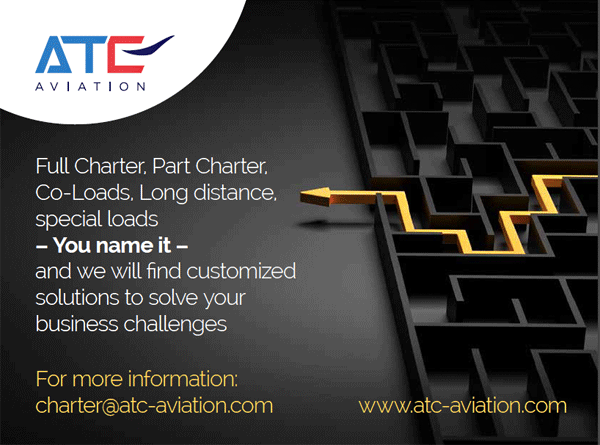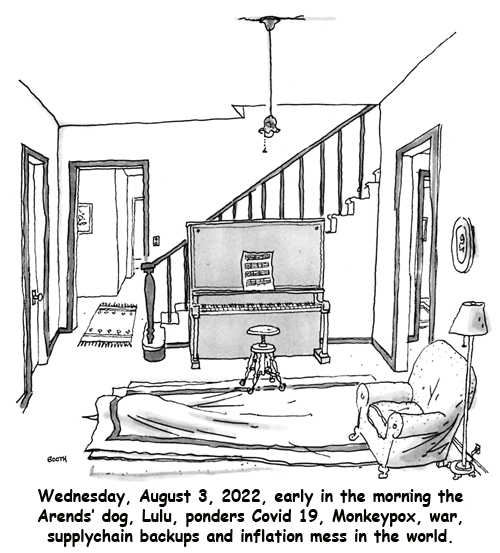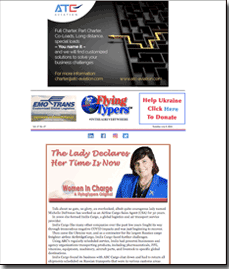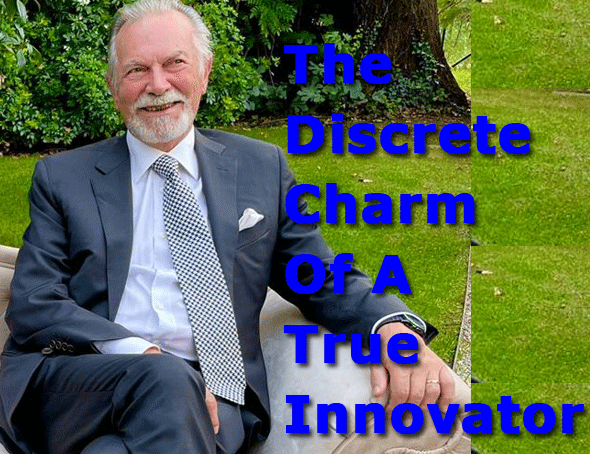 |
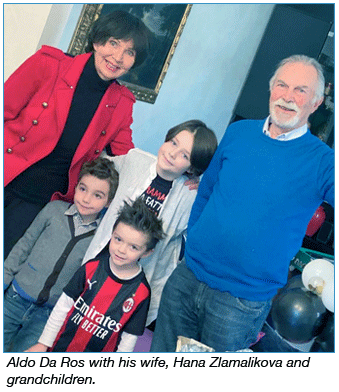 Aldo
Da Ros is an Italian entrepreneur, whose career looks like a miracle floating
in the space between his discretion and his high level positions. Standing
at a crossroads between different worlds and different histories, you
would be wondering why you have heard so little about him, but as I said
this is a miracle of discretion. In taking part in Gottardo Ruffoni, one
of the largest Italian freight forwarding companies in the second part
of last century, Aldo had a particular position in business across the
“iron curtain”. This is all the more relevant today, when
some of those memories reverberate so deep in our souls that “Russians
love their children too” could be extracted from a song written
yesterday. Reading Aldo’s disarming replies to questions that could
appear complicated is a lesson in life and a breath of fresh air in the
intoxicated room of today’s politics. Aldo was also President of
FIATA between 2001 and 2003, his tenure having started just days after
9/11 and has been active in the association for more than fifty years,
other than the impressive number of other appointments which are listed
in the interview! If you have not met Aldo Da Ros yet, it is high time
you read this interview. Aldo
Da Ros is an Italian entrepreneur, whose career looks like a miracle floating
in the space between his discretion and his high level positions. Standing
at a crossroads between different worlds and different histories, you
would be wondering why you have heard so little about him, but as I said
this is a miracle of discretion. In taking part in Gottardo Ruffoni, one
of the largest Italian freight forwarding companies in the second part
of last century, Aldo had a particular position in business across the
“iron curtain”. This is all the more relevant today, when
some of those memories reverberate so deep in our souls that “Russians
love their children too” could be extracted from a song written
yesterday. Reading Aldo’s disarming replies to questions that could
appear complicated is a lesson in life and a breath of fresh air in the
intoxicated room of today’s politics. Aldo was also President of
FIATA between 2001 and 2003, his tenure having started just days after
9/11 and has been active in the association for more than fifty years,
other than the impressive number of other appointments which are listed
in the interview! If you have not met Aldo Da Ros yet, it is high time
you read this interview.
FT:
Aldo, you have had several positions in FIATA for a
number of years, other than being President of FIATA in 2001-2003. How
do you perceive the FIATA we have in this millennium in comparison to
the what the association was in earlier times? I believe your memory goes
back at least three decades before 2000, correct? What is the main difference
in the approach and what has remained one and the same?
ADR: In
the past FIATA was a point of reference for international shipping and
forwarding companies through the FIATA Documents, which offered guarantees
and uniformity, as they were used and recognized internationally; this
was in my view the main interest for operators approaching FIATA. Today
everything is more complex, the role of the Federation was forced to evolve
with a continuous evolution and updating, developing new bodies and functions
in order to guarantee greater specificity and know-how in the new sectors
of our activity. The protection of forwarders’ rights and the guarantee
of continuity for our sector in today's and tomorrow's market cannot be
ignored by a Federation that is at the forefront of dealing with the many
risks of the system, e.g. the intrusiveness of the large maritime carriers.
Through an oligopoly-like system they appropriate entire segments of the
logistic chain. This has been noted and censured by FIATA, and even by
the FMC. It is a reality that must be faced through the cooperation with
the institutions and international bodies in a united and organised manner,
as provided by FIATA.
FT:
You have also been the President of the FIATA Foundation
for many years. Do you think there is still room for its function in developing
nations, after the world was dramatically changed by COVID and now a global
financial crisis ignited by inflation? Any suggestions for FIATA?
ADR: The
Foundation was created with the main objective of stimulating local associations
in emerging and developing countries for them to establish technical training
programs in the field of freight forwarding, by supporting and financing
Train the Trainers programmes. These could in turn educate new professionals,
with a view to including their support in the enhancement of the sector.
In light of today's problems such as the pandemic, economic crisis, inflation,
water and food shortages and now even war, that have a global impact and
interest, I believe it is even more crucial that our staff benefit from
up-to-date programmes. Support and investment tools for people in terms
of acquisition of technical and specific skills that can bring added value
especially in countries where the situation was already critical and complex
can be of even greater benefit to the individual, to the sector, but above
all to the economic system in general.
Today we have a great opportunity, thanks
to technology and global connection through portable devices, even in
a relatively inexpensive manner, we can spread knowledge and training
at reduced costs and with unheard of extensiveness. During my tenure I
sought and strongly wanted such development, promoting continuous investment
in this direction: I hope that all this, which I consider indispensable
and strategic, will be carried out by the FIATA Foundation going forward.
FT: The
2022 FIATA Headquarters was the first face-to-face meeting for all of
us in almost three years. Other than the flawless organisation of the
event, can you share your feelings about old colleagues you have met and
the new secretariat in Geneva?
ADR: For
50 years I have never missed a FIATA congress, even when in the past they
were held every two years at regional level. I had the opportunity and
the good fortune to meet many colleagues and professionals from all over
the world, gaining great experience and making new friends. The board
was comprised of charismatic characters and the differences over the decisions
to be made were at times intense; we even had difficulties created by
the use of different languages (simultaneous use of three languages: German,
English and French).
The President together with a small board
decided the policy lines of FIATA in those years. With the subsequent
amendment of the Statutes and the establishment of the Extended Board,
the Federation wanted to adopt a slightly more inclusive and democratic
approach. Until a few years ago, it included successful entrepreneurs,
leaders in the countries where their companies operated and who also acted
with an entrepreneurial spirit within FIATA.
After so many years, a lot has changed with
the advent of globalization and digitization. The great national entrepreneurs
have almost disappeared, making room for large multinationals, which were
able to create world networks by acquiring smaller companies at prices
that could not be renounced. The managers of these large companies have
replaced the entrepreneurs with their new approach, representing other
needs compared to the past. Consequently, things have changed within FIATA,
too.
Time ago FIATA was perceived as a European-centred
organisation, with some tension with regard to the rest of the world,
which was becoming more and more globalized, whilst non-European countries
were growing strongly and occupying increasingly important positions.
The issues concerning international transport
and forwarding today are complex and the bodies responsible for dealing
with these are many and rather different, so FIATA needs competent and
organized staff. I consider the decision to move to Geneva was appropriate.
Almost all the institutions that impact our sector are based in Geneva
and this ensures greater ease and opportunities in our relationships in
order to make our voice heard at all levels. The pandemic has prevented
face-to-face meetings for over two years; at such a critical moment of
change the inability to deal with issues face-to-face caused some misunderstandings
and even tensions that could have been easily resolved at the coffee break
as in the past. The Geneva congress made it possible to return to normalcy
at least in parts, to get to know and make ourselves known by the new
team, which I found to be competent and accessible. Nonetheless, for the
seniors as I am it will take some time to forget the old Zurich staff.
FT:
We all know you have been and still are very active
in Eastern Europe. Has your business been affected by the war in Ukraine?
Any observation from Eastern countries you have captured from your colleagues
in the area?
ADR: I
still maintain business relations with the countries of Eastern Europe
on a smaller scale than in the past. I had spent almost twenty years on
that connecting line, until the fall of the Berlin Wall, practically living
beyond the Iron Curtain for long periods of my life.
War is war and upsets everything, nevertheless
in the difficulties there are also opportunities for transport to and
from the countries involved in the war. It is believed that for our work
the more complicated things are, the greater the business opportunities,
so even in this situation it is possible to operate, albeit with quantities
limited by the embargo, within the limits dictated by the situation on
the field. There is more space for smaller companies that find smart and
tailor-made solutions, adapting to every transformation that the ever-changing
situation presents. We would be much happier without the war, but try
to contribute as best we can even in this dire situation.
FT:
We know your son Mauro is active in FIATA and ostensibly
in your business. How important is the family root in our sector? We have
seen a keen interest from investors to enter the freight forwarding business,
does it mean the landscape of the family business shall be less significant
in future?
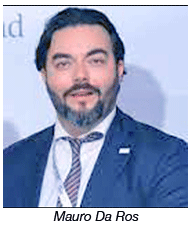 ADR:
There has always been a family tradition in
many Italian companies, some with success, others less so. I started as
a delivery boy in Rondine (the Italian specialist in Iron Curtain countries),
at the branch office which was managed by my father, then climbing up
the ladder of the positions to become a partner and eventually managing
director. My experience suggests that along with continuing within a family
business, you need to gain experience in other companies, far from the
comfort area of the family, avoiding the risk of confusing the relationships
with your colleagues. ADR:
There has always been a family tradition in
many Italian companies, some with success, others less so. I started as
a delivery boy in Rondine (the Italian specialist in Iron Curtain countries),
at the branch office which was managed by my father, then climbing up
the ladder of the positions to become a partner and eventually managing
director. My experience suggests that along with continuing within a family
business, you need to gain experience in other companies, far from the
comfort area of the family, avoiding the risk of confusing the relationships
with your colleagues.
At the end of the day though, it is more
difficult to reach large international dimensions for family businesses,
due to lack of adequate capital and because the positions they could attain
are already occupied by companies with greater financial capacity. Nonetheless,
I love and am passionate about this job, as it offers space for personal
and business growth. This can satisfy the needs of an entrepreneur. Even
more so for the family businesses which have tradition and proximity to
customers, formed through years of experience and continuity in relationships,
by identifying niche markets, taking the role of the local heroes, pushing
in the direction of tailor-made services. I am sure Mauro has learnt his
lessons and will be able to further expand our strategy.
FT:
You have also had a significant role within the Italian
logistics landscape and you have been involved in the once prosperous
and famous Gottardo Ruffoni. What remains today of that experience, any
lesson for the contemporary investor?
ADR: When
the Rondine was sold to Gottardo Ruffoni, I thought I had to look for
another job. I was offered instead to cover the position of managing director
of Gottardo Ruffoni, which controlled about 50 companies in the sector
scattered throughout Europe and I was even asked to join various boards
of directors in different locations. It was like going from the steering
wheel of a Fiat 500 to an ocean liner’s. I was helped a lot by my
co-workers, but it took patience, a lot of listening and common sense
just to keep floating . . . What remains of all this?
A great professional and human experience that I would never have dreamed
of, starting from the small village on the border with Austria where I
took my first steps, very young as a student who spent his holidays helping
his father in the Rondine local branch. My suggestion to new investors
is to avoid upsetting the relationships among the people working in the
companies they acquire: just imposing rules dictated from above without
verifying their effect is a No-Go. In my opinion, a serene climate within
the company leads to better results than rigid and vertical management.
Even controlling many employees, I always tried to make myself and the
company feel as close as possible to them, allowing reasonable growth
and limiting internal conflicts, that are inevitable in a large company.
FT:
Any regrets in your long career, any achievement you
have been particularly proud of?
ADR: No
regrets, I am happy with my career both professionally and within the
associations. Good fortune led me to the top of one of the leading companies
in Italy, and I am even prouder to have joined FIATA for many years and
to have had the honour and pleasure of becoming its President.
FT:
Is there any other point you wish to make or any issues
you consider crucial in your different functions?
ADR: If
I list the positions and honours in the many years, I am even surprised:
President of Assosped, Pontebba, IT, President of Alsea, Milan, IT, Vice
President of Fedespedi, Milan, IT, President of the Board of Statutory
Auditors of Confetra, Rome, IT, Vice President of Clecat, Brussels, BE,
President of FIATA, President of the FIATA Foundation, Zurich, CH, President
of the Propeller Club, Milan, IT, Founding Member of Freight Leaders’
Club, Milan, IT, Presidency of the Italian-Czech Chamber of Commerce,
Councillor of Cemat, Knight of the Italian Republic, Gold Medal of the
Moscow Chamber of Commerce, Gold Medal of the Prague Chamber of Commerce
. . . we are just missing the local plungers’ association
. . .
I believe that the future of the sector
is and always will be linked to the past: the task for us seniors is to
be mentors for the new generations, offering the possibility of sharing
experience, weighing risks and opportunities, and even savouring successes
with the unpretentiousness and wisdom of experience, still willing to
listen, to know and understand the new, alert with languages, methodologies
and modern tools, I believe that this is the real winning and successful
mix, which indeed is within the scope of the FIATA Foundation.
FT:
Thank you, Aldo, for taking this interview and congratulations
for your achievements and precious suggestions. I am sure many in our
readership will not pass this opportunity and may even come back with
comments.
Marco Sorgetti |
